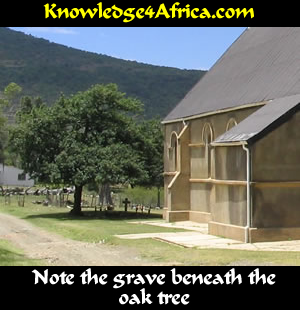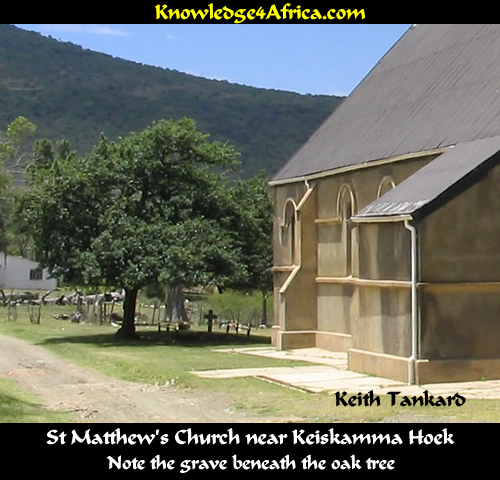|
READ THIS
Victor and Benedict disagree as to where they will find Crispin. It is Benedict who is right, however, for
he remembered the "isivivane" cairn near Mbokothwe where Crispin would have learnt to confess
his sins to the shades.
Yet, even before the funeral has taken place, Benedict himself leaves the mission -- to find Dorcas and
to find himself.
 CHRISTIAN ATTITUDE TO SUICIDE
CHRISTIAN ATTITUDE TO SUICIDE
Suicide for traditional Christians was a most serious sin.
Christians saw sin as falling into two primary categories:
- First, there were the small sins: little things like swearing, lying, being uncharitable, fighting, etc. If
one died in a state of such a sin, one would still go to heaven -- at least eventually;
- Then there were the serious sins: like rape, murder, etc. All sins listed under the Ten
Commandments fell into this category.
If one died while in a state of serious sin, one would go straight to hell. But one could always repent of
such a sin while one was still alive. Forgiveness would then follow.
Suicide fell almost within its own category. A person who committed suicide was believed to have died
in a "state of despair" and this was seen as a "sin against the Holy Spirit" from which there
could be no forgiveness.
So serious was the Christian Church's attitude towards suicide that, until very recently, such a person
could not even be buried within the boundaries of a Christian cemetery.
Cemeteries were consecrated places. People who had died in a known state of serious sin could
therefore not be buried there. Their bodies would instead be interred outside the cemetery walls.
All mission stations had their cemeteries. Crispin should therefore have been buried in St Matthias
Church cemetery but he was not. Instead he was buried beneath the great oak tree alongside the church.
Although his mother explained that this was his favourite tree, it was nevertheless an implicit recognition
that his suicide prevented his burial in sacred ground.
"Crispin had gone. By his own choice and by his own hand, risking the possibility that there might be
no gathering of shades to welcome him but only the void, the inescapable pain of sin and the sentence
of an unforgiving God."
If you look carefully at the photograph of St Matthew's Church at the top of this page -- upon which
Shades is based -- you will see that there is indeed a solitary grave beneath the oak tree
alongside the church.
Have you looked at the questions
in the right column?
|
TEST YOURSELF!
Read the left column and then answer
the following questions:
"Benedict was wrong. Victor was looking God in the eye and he could not bear the fire of that
scrutiny."
- Comment on the significance of these words. (6)

[Need help?]
The problem with Victor was that he had never looked God in the eye. As a result, challenges were
growing all around him -- challenges which he couldn't handle.
- Crispin had rebelled against him, and then committed suicide;
- Victor had failed the Pumani brothers;
- Benedict was rebelling against him;
- It was clear that Frances no longer loved him.
|
The "isivivane" cairn appeared to be important in Crispin's search for forgiveness.
- Explain its significance. (2)

[Need help?]
The "isivivane" cairn appeared to be significant as a conduit for contacting the ancestors or shades
or spirits of the dead.
If one could communicate with the shades by this means, then is it not possible to unburden one's
conscience by confessing to them.
|
- Why did Crispin choose to commit suicide there? (3)

[Need help?]
The "isivivane" cairn therefore serves as a confessional, as the means by which Crispin can find
relief for his soul.
Moreover, if it is possible to contact the shades through this means, then what did the shades tell Crispin
to do?
|
In the light of the traditional Christian attitude towards suicide, would you say that Crispin has gone to
heaven or to hell? (30)

[Need help?]
This is a really good topic to debate. A whole class can debate this issue for an hour or more!
Be careful with your conclusions though. If you are a Christian, remember that Jesus Christ instructed
his followers not to judge.
If you conclude that Crispin has indeed gone to hell, then you are guilty of both judging and of branding
God as a harsh Demiurge who lacks any form of love.
|
Benedict wrote, " . . . now I must be born, I must go forth alone. And if I should return, I will return in
freedom, for without that freedom I can never call myself a man."
- What precisely does Benedict mean by these words? (10)

[Need help?]
You need to examine Benedict's place in the world of the White colonists, together with his place in the
Xhosa world.
Christianity promised that he would become the equal of Whites but this clearly did not happen.
On the other hand, he was no longer an integral part of his own community. And, of course, there is the
question of Dorcas Pumani, whom he loved but was no longer allowed to meet.
|
- What significance do these words have for Victor, who is given the letter to read? (6)

[Need help?]
Victor was in a similar position as Benedict. The world had appeared to be waiting at his feet but he had
at last come to realise that all was changing.
Indeed, his entire world was crumbling before him. If Benedict had to be reborn, perhaps Victor did too!
Did Victor actually do anything to show that he was ready to be reborn? Or was his decision to set
Frances free not actually based on a decision to set himself free?
After all, Victor had moved up in the world and was already dating the Warburton daughter.
Indeed, the Warburton girl held far greater promise for a bright future than marriage to a naive mission
girl who would probably never forgive him for what he had done to her.
Frances therefore held it in her hands to make his life eternally miserable.
|
|




